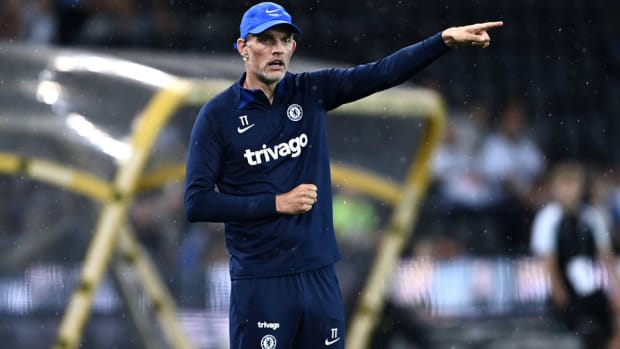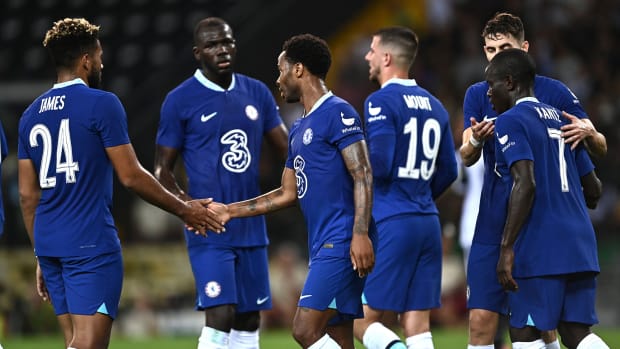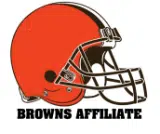The first full post-Roman Abramovich season is upon Chelsea, which has missed out on some desired signings and has the look of a power in need entering 2022-23.
View the original article to see embedded media.
Preseason doesn’t matter—except for when it does. Friendlies are always an unreliable guide to the season ahead because nobody ever quite knows how committed players are or what stage they are at in their fitness work. But Thomas Tuchel’s concern after Chelsea’s 4–0 defeat to Arsenal in Orlando on the penultimate weekend in July was real enough.
“I look at the last season and parts of the game where we struggled, parts of the season where we struggled, and then we got sanctioned and players left us and some players are trying to leave us, and this is where it is,” he said. “So we had an urgent appeal for quality players, a huge amount of quality players. We got two quality players, but we are not competitive like this.”
Small problems have merged to create bigger ones. Chelsea, oddly, left itself vulnerable by allowing the contracts of center backs Antonio Rüdiger and Andreas Christensen run down—and was then unable to offer them new deals when sanctions on owner Roman Abramovich were imposed in March. Rüdiger has since joined Real Madrid, while Christensen has technically joined Barcelona, although he is yet to be registered. César Azpilicueta, meanwhile, is effectively waiting to see whether Barcelona can afford him despite having a season-long contract extension with Chelsea kick in last spring, while Marcos Alonso is in a similar boat.

Gribaudi/ImagePhoto/Imago Images
A similar problem is coming into view in the midfield, with Jorginho and N’Golo Kanté both over 30 and entering the final year of their respective contracts. Up front meanwhile, the issue has been that none of Romelu Lukaku, Timo Werner or Hakim Ziyech has really clicked. Lukaku has been offloaded on loan to Inter, while Chelsea has made clear it is happy to sell Werner and Ziyech, as well as Callum Hudson-Odoi, who has struggled to regain his form after rupturing his Achilles. Werner, in particular, is reportedly close to returning to RB Leipzig, like Lukaku hoping that his pre-Chelsea form can be recaptured at a familiar home.
All of this would have made for a major rebuild for whomever was in charge and, as it has turned out, nobody really is. Key figures Marina Granovskaia, Bruce Buck and Petr Cech have all left the club in the aftermath of the post-Abramovich takeover, leaving new owner and nominal sporting director Todd Boehly to handle negotiations despite his dearth of experience in the sport and in that role. Being beaten to both Raphinha and Jules Koundé by Barcelona, a club that is over $1 billion in debt and so stricken it remains in need of financial creativity to register the players it has picked on its trolley dash, has been a harsh lesson in the complicated economics of modern football.
Chelsea has managed to bring in two players this summer, Raheem Sterling and Kalidou Koulibaly, for roughly $100 million. Sterling, as a key part of the Manchester City side that has won four of the last five Premier League championships, might have been expected to raise greater excitement given his pace, his pressing and his goals record, but the sense with him is that of a forward whose decision-making can go awry under pressure. That City was prepared to let him go may be telling. He should, though, be a fit for Tuchel’s vision, and he has linked up with both Mason Mount and Ben Chilwell, now happily back after injury, for England.

Gribaudi/ImagePhoto/Imago Images
Koulibaly is clearly a player of high quality, and it helps that he and Chelsea goalkeeper Édouard Mendy play together at the international level for Senegal. But he is 31—raising the question of why he stayed at Napoli for so long—and with the departures there is a clear need for at least one more central defender. Koundé, it seems, was never Tuchel’s first choice, and there has been recent interest in both Leicester’s Wesley Fofana and Arsenal’s William Saliba.
As the new regime seeks to replicate something of Liverpool’s transfer strategy by empowering Tuchel, much will depend on his relationship with Boehly, and that could be strained if there are not more signings over the coming month. It’s telling that after Boehly had seemingly come close to an agreement to sign Cristiano Ronaldo from Manchester United, the move was vetoed by Tuchel. For now the plan to give him control seems to be holding, but it’s not hard to imagine that becoming a point of friction if Chelsea proves as lacking in incisive attacking as it did last season.
Assessing a realistic target this season is tricky. Chelsea did seem to be in a three-way title race up through December last year, but it has seemingly declined while Tottenham, in particular, has clearly improved since then. Too much of a gap probably remains between Chelsea and the top two, Man City and Liverpool, meaning the target will be Champions League qualification, but developments elsewhere mean that while third place is still well within reach, that is probably a stiffer ask than it was last season—a point underscored by Tuchel’s reaction to a result that, on the surface, shouldn’t mean much but carries with it some bigger-picture concern.
More Soccer Coverage:


















